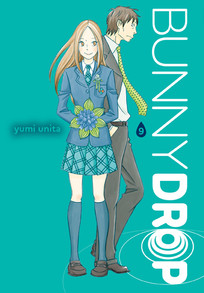Review
by Rebecca Silverman,Bunny Drop
GN 9
| Synopsis: |  |
||
Kouki is still hurting from Rin's rejection and knows that she's hiding something. When he gets her to admit what it is, however, he is shocked – Rin is in love with Daikichi. Troubled by this news, Kouki reveals what he knows to Daikichi. When Rin gets upset and goes to her mother for advice, what will the outcome be? |
|||
| Review: | |||
There are moments when one longs to be wrong, and the ninth volume of Yumi Unita's Bunny Drop manga is most certainly one of them. Rumors of the projected ending of what began as a lovely story about a man raising a daughter have been rife for some time, and now curious readers can see for themselves how Unita ends the story. It feels safe to say that it will be a polarizing decision for many who have been following the story from the beginning. We have suspected, if not outright known, that Rin harbors feelings that are not at all daughterly for Daikichi almost since the time skip in volume five. In this book she confirms that, yes, she is in love with the man who raised her. She claims that she does not want Daikichi to know, nor does she want anything to come of it, claims which are severely tested as the volume progresses. When her would-be boyfriend and childhood companion Kouki, troubled by what she has told him, confronts Daikichi with the news, Rin is horribly upset. In part, of course, this is the embarrassment of a sixteen-year-old girl whose secret is out, but there is also an element of worry that now that he knows, Daikichi might reject her. She flees the house and later decides to go to visit her mother, Masako, to discuss the problem. Masako has herself been a difficult character from her first introduction. Whether you see her as a terrible mother or as a young woman not yet ready for motherhood, her rejection of her daughter and apparent selfishness gave her a somewhat unlikeable aura. Now, however, her advice to Rin and Daikichi borders on the irresponsible, or at the very least the ill-advised as she basically tells Daikichi to go for it. Rin, she believes, is too serious for this infatuation to be a phase, and Daikichi should respect that. Were he not her father figure, this may have been easier to accept or brush off, but when we step back, what is happening is that a woman who knows little to nothing about a teenage girl who has come to her for advice is suggesting that she and a man thirty years her senior engage in an inappropriate relationship. Perhaps this will not bother some readers; after all, we could interpret the situation as Masako recognizing True Love when she sees it and encouraging it to flourish. This brings us to Daikichi. Does he see Rin as anything other than his daughter? While some readings of the text and images towards the end of the book could lead to readers to believe that he could develop romantic feelings for her, this particular reader sees a man who is greatly conflicted and totally uncomfortable. Daikichi, as has been made clear almost from book one, sees Rin as his child. Because of Masako's words, he expresses a possibility of them forming a romantic relationship once Rin has graduated from high school, but his facial expressions and body language when we reach that point suggest otherwise. If ever there was a moment for the man to step up and really be a parent, telling her “no” and offering to get her psychiatric help, this is it. That he does not makes the ending very uncomfortable, regardless of any literary precedent that exists. Unita relies more on image than text to help tell the story as the series comes to its conclusion, with great swathes of pages containing few speech bubbles. This certainly allows for more reader inference about the situation than blocks of text (never her style) would, and essentially lets us all draw our own conclusions about Daikichi's feelings specifically. While Unita's art has never been particularly expressive, in this case it works to allow readers to come to their own conclusions. There is a definite broadening of the hips and thighs in the way Rin is drawn, and arms and legs, which grew to ridiculous lengths in previous volumes, seem to be back under control. Rin remains the major point of view character for most of this volume, as has been the norm since the time skip, but Daikichi gets his time as well. If you have not been happy with Bunny Drop's direction since the time skip and you have not fallen prey to the sunk-cost fallacy, which would declare that since you read this far you have to finish the series, I would not suggest reading this book. Fears that have been bandied about for some time now are made real, and if this is not your cup of tea or if it makes you uncomfortable, it might be best to wait for the short stories of volume 10, which will return to Rin's childhood. If it doesn't bother you, however, this volume doesn't quite contain the charm of many of its predecessors, but it does have its sweet moments. It may not be the ending many were hoping for, but Unita does wrap things up fairly well. |
| Grade: | |||
|
Overall : C
Story : C-
Art : B-
+ Ending is smoothly done and feels conclusive without being final. Improved artwork in terms of limbs, very open to interpretation. |
|||
| discuss this in the forum (98 posts) | | |||
| Production Info: | ||
|
Full encyclopedia details about Release information about |
||